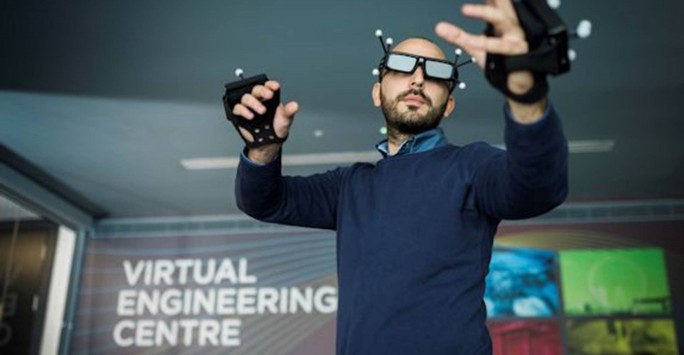Cognitive and Clinical Neuroscience
The aim of our research is to further understanding of the neurobiological and psychological foundations of cognitive and sensory functions in the human brain.
Clinical Neuroscience
Aims
Our key aim is to understand the cognitive and neural mechanisms underlying neuroplasticity, sensory experiences, and visual health, to improve psychological resilience and quality of life for individuals with neurological and visual conditions. We aim to characterise the neuroplasticity processes that support positive adaptation to environmental challenges and to develop personalised interventions based on factors such as age, sex, adversity exposure, and genetic risk for neuropsychiatric disorders. Additionally, we investigate the cognitive and neural basis of hallucinations and the role of mental imagery in mental health, including its consequences in conditions such as aphantasia and hyperphantasia. Our research further focuses on exploring effective treatments and interventions for macular degeneration and other visual diseases such as Charles Bonnet Syndrome and Hemianopia, aiming to improve the quality of life and mental well-being for affected individuals.
Approaches
Our research employs a multidisciplinary approach, combining behavioural studies, neuroimaging (e.g., fMRI), eye tracking, transcriptomics, and polygenic risk analyses. We utilise both longitudinal and cross-sectional big data from neuroimaging and genetic population datasets, including typically and atypically developing individuals. To investigate hallucinations, we use innovative techniques such as the Ganzflicker hallucination simulator and apply mixed methods (quantitative and qualitative) for analysis. In the context of visual disease, we incorporate clinical data alongside advanced neuroimaging and eye-tracking methodologies to explore interventions that improve mental well-being and quality of life. This integrative approach allows us to bridge fundamental neuroscience with clinical applications, addressing theoretical and practical clinical neuroscience challenges.
Decision Making and Computational Modelling
Aims
Our key aim is to understand how people make decisions and deal with uncertainty in information and knowledge, as well as how decision-making can be improved or optimised in important contexts. To achieve this, our research involves developing, refining, testing, and applying computational models of cognition, and developing and utilising a range of statistical and computational methodologies. We also aim to answer more applied research questions by applying the models and methods that we develop to other research areas, such as cognitive neuroscience, behavioural economics, developmental psychology, and social psychology. Importantly, our models and methods can provide unique insight into how people in different situations, and/or different groups of people, may differ in their ability to perform certain tasks or the strategies that they use for certain tasks.
Approaches
Our research combines approaches from the areas of cognitive science, psychological methods, and experimental psychology. This combination of approaches is crucial to achieving our research aims: to ensure that the computational models of cognition that we develop and refine are accurate representations of human cognition, we must test them against empirical data, which requires advanced computational and statistical techniques. We develop and utilise a range of methodologies, including Bayesian approaches to statistics and modelling, simulation and approximation methods for fitting models with intractable likelihood functions, and experimental and statistical approaches for testing and comparing computational models of cognition.
Neurobiology of language and memory
Aims
Our goal is to establish how the human brain can perceive, understand and remember our complex real-world experiences, with a particular focus on naturalistic language experiences, both spoken and signed language and its interactions with memory. We also investigate how language and memory functions break down in individuals with brain damage to obtain unique insights, informative for cognitive neuroscience models of language and memory.
Approaches
Our research makes use of multiple methodologies, including functional and structural MRI (fMRI, DTI), EEG, computational modelling and TMS to provide convergent evidence on the neural basis of language and memory in healthy and patient populations, and to translate these findings from cognitive neuroscience to clinical settings.
Perception
Research Aims
Perception is one of the most scientifically mature areas in psychology. Psychophysics, Neuropsychology and Gestalt psychology are over 100 years old. In Liverpool, we study the way the visual system groups local elements into symmetrical configurations. We are also interested in preference formation. Why are some configurations appealing and beautiful? The visual image is not static. How do we compute motion signals? Finally, the visual system does not work in isolation. How do we integrate visual and auditory information?
Research approaches
We use a combination of neural and behavioural methods. A lot of our research uses EEG to investigate visual grouping. We can measure signals from the visual cortex and discover the conditions under which perceptual organisation happens. We work closely with the open science movement and carefully archive EEG data in public repositories.
We investigate multisensory integration by combining behavioural methods (psychophysics, reaction times, motion and eye-tracking), computational modelling (Bayesian ideal observer models, biological cybernetics and neural models) and physiological measures (fMRI, EEG). This has direct applications for learning, rehabilitation and novel interactive technologies.
Knowledge Exchange
- We conduct multidisciplinary research through cross-Faculty collaboration (e.g. with the Department of Electrical Engineering and Electronics).
- We partner with local NHS trusts including the Walton Centre, Alder Hey Hospital, Aintree University Hospital and Broadgreen Hospital.
- We engage with beneficiaries of research including NHS patients, local and international businesses.
- We provide representation on national expert panels to inform the research strategy of major research funders (e.g. Versus Arthritis).
- We collaborate with other major Universities (including Manchester and Cambridge).

Virtual engineering centre (VEC).
Our collaboration with the VEC has led to the integration of VR technologies and immersive environments in education and business. Watch an example of VR in action.